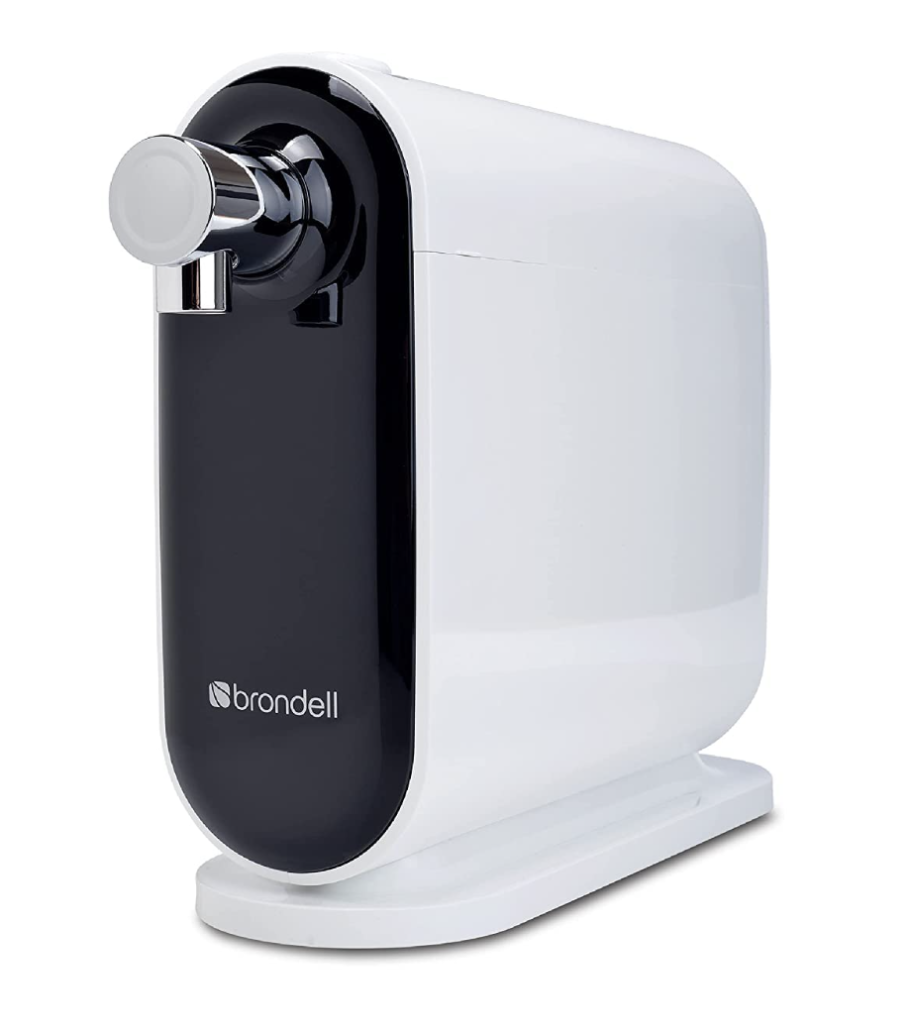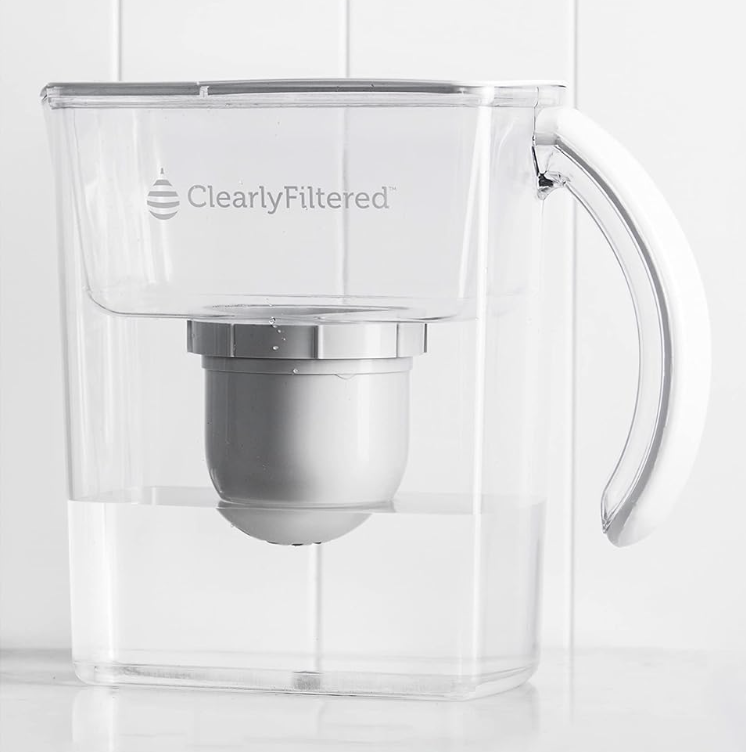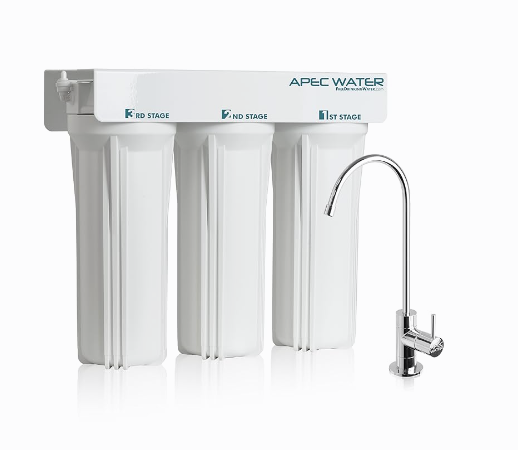There are 4 types of home water filters to consider based on installation:
- Under-the-sink
- Countertop
- Faucet-mounted
- Whole-house
Quicker and easier installations like countertop and faucet-mounted is a good place to start because it means you can stop using bottled water sooner. You can always upgrade to a bigger and better system. See the cost breakdown at the end of this post for details on how much you’ll save by switching sooner.
There are 5 main types of water filters, to consider based on the specific types of contaminants they are able to remove from water:
- Activated Carbon Filters: These filters use activated carbon granules, which are very porous and have a large surface area, making them effective at absorbing impurities like chlorine, pesticides, and some organic compounds. They can improve taste and odor but may not remove minerals, salts, and dissolved inorganic substances. This is the type of system most counter-top filters utilize.
- Reverse Osmosis Filters: Reverse osmosis (RO) systems use a semipermeable membrane to remove a wide range of contaminants, including dissolved salts, bacteria, viruses, and chemicals. RO filters are highly effective but can be more expensive and produce wastewater in the filtration process.
- Ion Exchange Filters: These filters are particularly effective at softening water by removing minerals like calcium and magnesium, which cause hardness. They work by exchanging ions in the water with other ions (usually sodium or hydrogen ions) fixed to beads in the filter.
- Ultraviolet (UV) Filters: UV filtration uses ultraviolet light to disinfect water, effectively killing bacteria, viruses, and other pathogens. It’s a chemical-free method but doesn’t remove chemical contaminants, particles, or dissolved substances.
- Distillation: Distillation involves boiling water and then condensing the steam back into liquid. This process removes minerals, bacteria, and chemicals that have a higher boiling point than water. It’s very effective but also energy-intensive and slow.
Deciding Which Type To Buy
A good place to start is by addressing the core reason you’re drinking bottled water in-lieu of tap water, then find a low-cost and convenient filter to meet your needs. The two most common reasons people drink bottled water instead of tap (at home) are:
- Taste – if you aren’t worried about the quality of your tap water but dislike the taste, a simple counter-top filter is a great place to start.
- Health – if you’re drinking bottled water because your tap water has some sort of contaminant, you may want a heavy-duty filter which is most commonly going to be an under-the-sink filter but premium models of other types can meet your needs.
Finding The Right Type of Water Filter
Try the Environmental Working Group’s tool for evaluating tap water in your area and learning what type of filter will be able to filter out contaminants found in your local water source.
Here’s how to check their database:
After using the EWG tool you should have a good idea of what type of filter you need to reach your desired quality of drinking water. We’ve listed additional considerations below these recommendations to further help guide your decision.
Recommended Countertop Water Filters
When reducing bottled water use, the sooner you can break the habit the better. If getting a countertop water filter will help you stop buying water bottles, it’s probably a good move, even if you want an under-the-sink or full-house option. You can still use it after upgrading and between now and when you get your more effective filter installed, you can start reducing bottle water use.
Here’s what we recommend:
Simple And Quick
Activated Carbon
Clearly Filtered Water Pitcher
Across the board this is the most recommended water pitcher filter, primarily because of its comprehensive filtering system.
Longer-Term Solutions
Activated Carbon

Brondell H630 Cypress Countertop
This countertop filter is highly rated because of its filtration system, multiple certifications, and its nice design.
Reverse Osmosis
This can be countertop or under-sink and is easy to install with most standard kitchen sink setups. As it’s reverse osmosis it has better filtering capabilities than the other options mentioned.
Recommended Reverse Osmosis Water Filters
Reverse osmosis filters are the best longterm options because they filter out the most contaminants. But they will require a little more research on your part to make sure you get the right fit for your home.
Consider These Variables:
- Size – how much space do you have for the water filter? You can easily measure the space under your sink and all brands provide the specs on how much space is needed.
- Capacity – how much water will you need per day? On average, an individual typically drinks about 2-4 liters (0.5 to 1 gallon) of water per day. Therefore, for a household of four, this would translate to roughly 8-16 liters (2 to 4 gallons) per day just for drinking.
- Installation & Filter Replacement – can you do the installation relatively easily yourself or will this be an added cost? Based on your water consumption how often will you need to replace filters?
Best Brands
The highest-rated brands for reverse osmosis home water filtering systems, based on various consumer reviews and expert recommendations, typically include:
- APEC Water Systems: Known for their efficient and reliable systems, often featuring multi-stage filtration processes.
- iSpring: Offers a range of reverse osmosis systems, including under-sink models with different stages of filtration.
- Express Water: Well-regarded for their quality systems that come with clear installation instructions and good customer support.
- Waterdrop: Recognized for their innovative tankless reverse osmosis systems which save space and are efficient.
- Home Master: Their systems are often noted for addressing common issues with reverse osmosis systems, such as slightly acidic water or low water flow rates.
- Whirlpool: Known for offering durable and efficient reverse osmosis systems suitable for various household needs.
Cost Considerations: Cost per Gallon
Are home water filters more cost-effective than buying bottled water?
The key factors are:
- Initial cost of water filter system
- Costs for filter replacements
- Gallons of water you can filter
Water Pitchers (Activated Carbon)
For the average activated carbon water pitcher filter costs work out to be:
- $1.00 per gallon for the first 40 gallons (initial product purchase)
- $0.25 per gallon for every gallon after that (replacement filter costs)
From day one this is less expensive than the cost of bottled water which on average is $1.20 per gallon in the US.
Reverse Osmosis Filtration System
The startup cost for a more advanced system with reverse osmosis is higher, but it filters significantly more gallons per filter (around 12,000), bringing to cost per gallon way down.
- $0.03 – $0.05 per gallon for the initial system
- $0.02 per gallon after replacements
While there is a higher cost to get started ($200 – $500 plus installation if needed), per gallon these systems are much more cost effective than bottled water ($1.20 per gallon).


